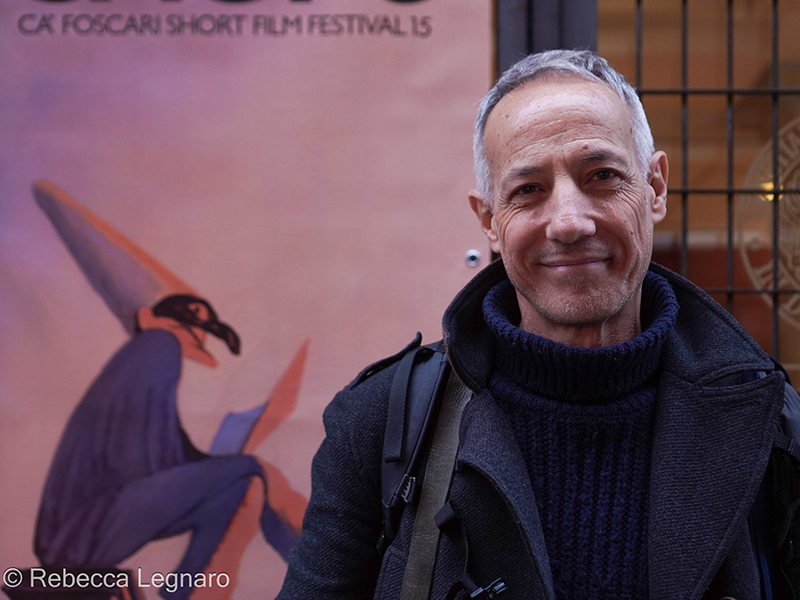Venice, March 22nd, 2025. Among the guests at this year’s Ca’ Foscari Short Film Festival is Roberto Catani, animator and illustrator from the Italian region of Marche, Catani was the main speaker for a masterclass on the Festival's third day. During the talk, moderated by Andrijana Ružić, the artist’s stylistic evolution was emphasized by the showcasing of his main works, divided in two sections.
Catani trained at the Scuola del Libro di Urbino (School of Arts in Urbino), where he is currently a teacher of animated drawing. In his works, which are often autobiographical, he explores personal memories with an introspective approach. He said that he “has been influenced by the evolution of his cultural and artistic interests,” which also affected his technical evolution: in the 1990s, he would use black paperboard and pastels, whereas starting in year 2013, he adopted a technique using white paper and oil pastels. During the masterclass, Catani spoke at length about his artistic career, starting from the main influences that shaped his youth. He has always been inspired by the Russian animator Jurij Norštejn, and he decided to become an animator ever since he discovered his films: “I have always dreamed of doing animation, but fear always stopped me”, this is why his first film is only one minute long.
The first round of showcased short films includes Il pesce rosso (1995), La sagra (1998), and La funambola (2002), stylistically connected by the use of chalk on black cardboard. Il pesce rosso is the only film he made using voiceover, through the reading of a poem. La sagra is a movie about his childhood experiences, particularly the celebrations in a small town near Jesi, where he used to live. La funambola, on the other hand, talks about motherhood - also referring to his own mother - a work that marked a turning point in his career, giving him many opportunities and drawing the attention of Canadian composer Normand Roger.
The second round of short films includes the installation La Lupa from 2006, which he had never screened in a theatre before. Created for Kristin Jones, American artist, La Lupa is a collection of drawings of the mythical Roman she-wolf, which were projected for one night on the retaining walls of the Tiber river, in Rome. Catani describes it as an important film, marking a moment of passage in his technical experimentation. Next, his shorts La testa tra le nuvole (2013), Per tutta la vita (2018) and Il Burattino e la Balena (2024) were screened. The latter, presented last year at the Venice International Film Festival, is a reinterpretation of Pinocchio: “A child who refuses to be like other humans. He doesn’t want to fit in.” The author talks about how he spent years trying to find the courage to tell this story, his personal school trauma. This short also has a certain political connotation, as the author asserted, “I wanted to craft a hymn to disobedience, because the current political choices are destroying us”.
Catani then told the audience about the relationship between his movies and music. In his short films the soundtrack is always original, and often the author envisions the music even before his drawings. To do this, he works closely with partners such as Andrea Marignoni, with whom he developed a trusting relationship, collaborating for La testa tra le nuvole and Per tutta la vita. He then showed the audience a fascinating footage of how his illustrations come to life and the design process through which he crafts his movies: notes, storyboard, music, character design, studies on the characters’ final forms, and color rendering with various techniques. Catani also demonstrated the rotoscope technique, which he used to create Il Burattino e la Balena and which also allowed him to create characters from modeling clay, to study how shadows fall on the face and perfectly duplicate them in drawing.
Lastly, his next projects he stated: “I dream about not doing animation anymore… If this need ever arises again, I have an idea that came after Il Burattino e la Balena.” However, he lamented “the great expenditure of energy and time that [his] technique requires.” Thus ended this fascinating masterclass, through which the audience of the Short was able to dive into the narration of Roberto Catani’s creative process and animated world, in all its evolutionary stages.
Artistic and Operative Direction
Maria Roberta Novielli
Dorsoduro 3484/D – 30123 Venezia
Telephone: 041 234 6244 | Email: cafoscarishort@unive.it
Media Relations
Studio Morabito
Telefono: 0657300825 | Email: info@mimmomorabito.it
in collaboration with: Eugenio De Angelis
and Press Relations Group CA' FOSCARI SHORT FILM FESTIVAL 15
Telefono: 041 234 6244 | Email: cafoscarishort@unive.it
Communications and Institutional Promotion Office
Media Relations Branch
Dorsoduro 3246 - 30123 Venezia
Federica Ferrarin: Tel 041 2348118
Enrico Costa: Tel. 041 2348004
Paola Vescovi: Tel. 041 2348005
Email: comunica@unive.it
